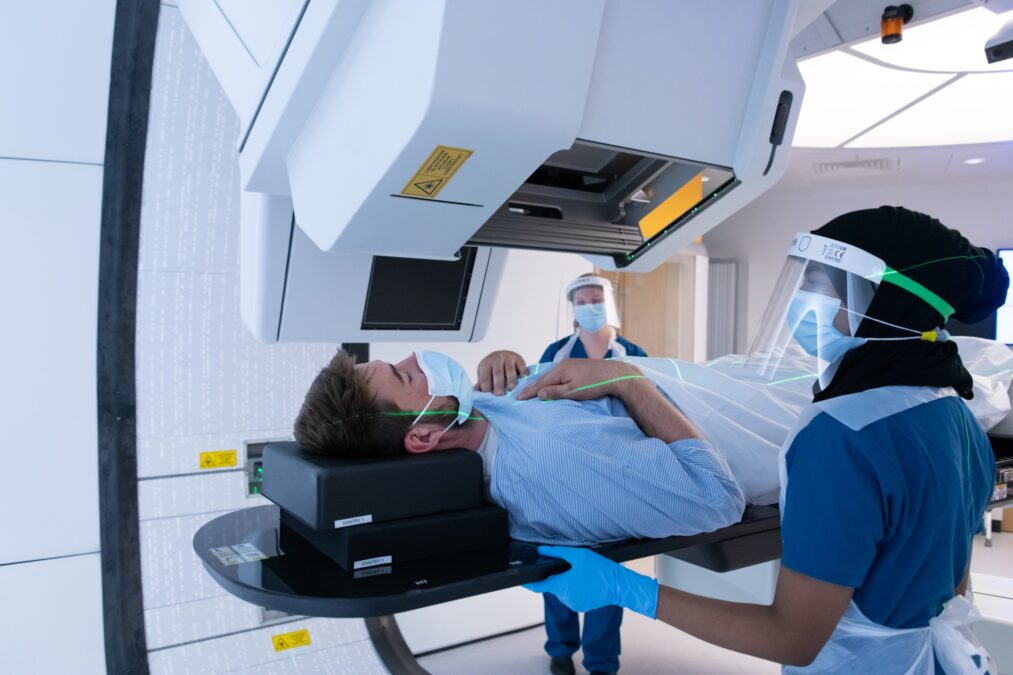Skull-based tumours, which develop deep in the skull bone under the brain, or closely related to it, often behind the eyes, nose, and ears, can pose complex challenges due to their closeness to the brain, crucial nerves and blood vessels connected to the brain, and the spinal cord.
Skull base tumours can affect individuals of any age, and the specific symptoms experienced by patients depend on the size and location of the tumour within the skull. It is important to note that not all skull base tumours are cancerous, yet even benign tumours can cause symptoms that significantly impact a patient’s overall well-being and health. Treatment options for skull-based cancers may involve surgery, radiotherapy (including proton beam therapy), chemotherapy, and targeted drug therapies.
The treatment of skull-based tumours requires a multidisciplinary approach due to their complexity. Specialised healthcare professionals, including surgeons, radiation oncologists and medical oncologists, assess each patient’s case and determine the most suitable treatment plan.
Skull-based tumours can be classified based on their location and the tissues they affect. Common types include:
- Meningiomas: These usually benign tumours develop from the protective membranes covering the brain and spinal cord, known as meninges.
- Pituitary adenomas: These benign tumours arise in the pituitary gland, a small gland situated at the base of the skull, behind the eyes.
- Craniopharyngiomas: These benign tumours arise close to the pituitary, most commonly in children and young adults
- Chordomas and chondrosarcomas: These rare malignant tumours commonly occur in the bone of the skull base and spine.
- Schwannomas: Originating from Schwann cells in the nervous system, these benign tumours are very rare and emerge from the tissue surrounding nerves.
- Glomus tumours: Also referred to as paragangliomas, these benign locally aggressive tumours frequently occur in the middle ear or along the carotid artery.
The treatment approach for skull-based tumours depends on various factors, such as the tumour type, location, size, aggressiveness, and the patient’s overall health.
Determining Eligibility for Proton Beam Therapy for Skull-Based Tumours
Determining whether proton beam therapy (PBT) is a suitable treatment option for skull-based tumours depends on several factors.
A multidisciplinary team of specialist healthcare professionals, including radiation oncologists, neurosurgeons, and medical oncologists, will make this decision.
Key considerations include:
- Tumour type and location: Proton beam therapy has proven beneficial in treating skull-based tumours such as chordomas, chondrosarcomas, and malignancies affecting the paranasal sinuses and nasal cavities, which require high doses of radiation. This treatment is particularly suitable for tumours located near critical structures such as the optic nerves or brainstem, where precise radiation delivery is vital.
- Tumour size and extent: The size and spread of the tumour influence the suitability of proton beam therapy. It can be advantageous for larger tumours, as it allows for highly targeted radiation while minimising damage to surrounding healthy tissue.
- Your overall health and fitness as well as medical history, including any previous treatments, surgeries, or underlying health conditions, are taken into account when considering the suitability of proton beam therapy.
- Availability of proton beam therapy facilities: Proton beam therapy is not widely available. There is a mix of both private and NHS-funded proton beam therapy treatment available in the UK: The Christie Hospital in Manchester treats NHS patients, and UCLH offers treatment to both NHS patients, and to and private patients through Proton International London. At Proton International London, we offer a dedicated concierge service and can assist with sourcing accommodation in London close to the centre for the duration of your treatment.
To determine whether proton beam therapy is an appropriate treatment option for your specific case, you should discuss it with your healthcare team. They will review your medical history, undertake necessary diagnostic tests, and discuss the potential benefits, risks, and alternatives to PBT in relation to your individual circumstances.
Why Proton Beam Therapy is Effective for Skull Base Tumours
Proton beam therapy is a type of radiotherapy that utilises high-energy protons to target and eliminate cancer cells. Unlike x-rays or other radiation sources, proton beam therapy offers several advantages when treating certain types of skull base tumours:
- Precise targeting: Proton beams can be precisely directed and controlled to deliver radiation specifically to cancer cells while sparing surrounding healthy tissues. This precision is crucial when skull base tumours are located near critical structures. This is especially important for benign tumours, for which minimising side effects is a key aim of treatment.
- Reduced side effects: By minimising radiation exposure to healthy tissues, proton beam therapy has the potential to reduce the risk of side effects and improve patient outcomes.
- High dose delivery: Proton beams can deliver a high dose of radiation directly to the tumour while sparing the dose to surrounding healthy tissues, increasing the chances of controlling the tumour in the long term.
- Favourable outcomes: Clinical studies suggest that proton beam therapy can achieve high rates of tumour control while minimising side effects for specific types of skull base tumours.

Proton beam therapy, also known as particle therapy, offers exceptional precision in delivering radiation doses to tumours. This enhanced precision, compared to photon therapy provides specific benefits for the treatment of certain skull base tumours.
To learn more about how proton beam therapy works to treat skull base cancers, read our guide here.
How to Access Proton Beam Therapy for Skull Base Cancer
Not all skull base tumours can be treated with proton beam therapy. However, at Proton International London, we can provide second opinions to determine the suitability of this treatment option for your specific case.
It is crucial to consult with your local healthcare team, who will evaluate your medical history, conduct necessary diagnostic tests, and discuss the potential benefits, risks, and alternatives to proton beam therapy based on your individual circumstances.
At UCLH, your case will be thoroughly reviewed at a multidisciplinary team meeting (MDT) comprising specialists in skull base tumour treatment, including surgeons, radiation oncologists, medical oncologists, and radiologists. They will consider factors such as tumour type, location, size, age, and general health.
If proton beam therapy is deemed appropriate, your consultant will present your case at a Technical Approval Panel, to confirm that proton beam therapy is technically feasible for treating your tumour.
If the panel agrees that proton beam therapy is a suitable treatment for you, our team will contact you to provide the necessary practical information for having treatment with us. We will coordinate with all involved in your care to promptly arrange treatment and ensure that any concerns you may have are addressed and minimised.
Proton International London: Specialists in Proton Beam Therapy for Skull-Based Tumours
Proton International London, located at University College London Hospital (UCLH), is a private proton treatment centre that specialises in treating skull-based tumours using proton beam therapy (PBT). The team works in partnership with the oncologists and radiologists from UCLH NHS Foundation Trust.
These professionals have a strong focus on clinical research and offer comprehensive, high-quality care to patients with various types of cancer, including extensive experience in treating skull-based tumours. Proton International London provides a unique treatment option for PBT in the UK.
Contact Our Proton Beam Therapy Specialists Today
At Proton International London, we specialise in treating skull base tumours using proton beam therapy (PBT). If you would like to learn more about proton beam therapy or have any questions, please reach out to our dedicated team, who will be delighted to assist you.

This article has been clinically reviewed by Proton International Medical Director and Consultant Clinical Oncologist, Dr Beatrice Seddon. Dr Seddon specialises in the use of radiotherapy (including proton beam therapy) and chemotherapy for the management of soft tissue and bone sarcomas.





